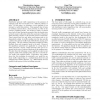Free Online Productivity Tools
i2Speak
i2Symbol
i2OCR
iTex2Img
iWeb2Print
iWeb2Shot
i2Type
iPdf2Split
iPdf2Merge
i2Bopomofo
i2Arabic
i2Style
i2Image
i2PDF
iLatex2Rtf
Sci2ools
117
Voted
CCR
2000
2000
Decentralized optimal traffic engineering in the internet
Distributed optimal traffic engineering in the presence of multiple paths has been found to be a difficult problem to solve. In this paper, we introduce a new approach in an attempt to tackle this problem. This approach has its basis in nonlinear control theory. More precisely, it relies on the concept of Sliding Modes. We develop a family of control laws, each of them having the property that the steady-state network resource allocation yields the maximum of the given utility function, subject to the network resource constraints. These control laws not only allow each ingress node to independently adjust its traffic sending rate but also provide a scheme for optimal traffic load redistribution among multiple paths. The only nonlocal information needed is binary feedback from each congested node in the path. Moreover, the algorithms presented are applicable to a large class of utility functions, namely, utility functions that can be expressed as the sum of concave functions of the sen...
Related Content
| Added | 17 Dec 2010 |
| Updated | 17 Dec 2010 |
| Type | Journal |
| Year | 2000 |
| Where | CCR |
| Authors | Constantino M. Lagoa, Hao Che |
Comments (0)

